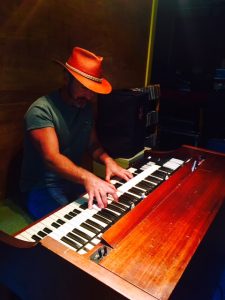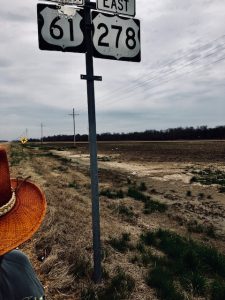
When it comes to southern roots music, the Dickinson brothers are keeping it alive and fluid in a way that is reaching a new generation. Their late dad, James Luther Dickinson, was the authentic goods: a Memphis icon as both a musician and record producer. He was also a musicologist and that’s why Ry Cooder sent him to me as an adviser when we were prepping “Crossroads” in 1985.
Jim said he dug my script, and he offered some beautiful insights into blues history, the Robert Johnson narrative, crossroads lore, and the need for taking the music — in the movie — outward and onward. I can’t recall for certain, but I think it was Jim who gave me the line “Muddy Waters invented electricity.” Which all makes sense now when one considers how his preternaturally gifted sons, Luther and Cody are drilling down into the traditions while taking the music to new places.
Both of the Dickinson boys confided in me that my movie served as an inspiration in part. Devon Allman, Gregg’s son had told them the same, they said. With that, we began conversations and made some plans to get together and share stories, maybe jam. “Come on down and rock out with us,” Cody said when I first met him, in person, at a Gregg Allman tribute show at the NY City Winery.
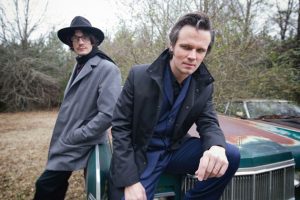
So, at the end of my solo road trip through the Delta, and after a night in Memphis, eating BBQ and enjoying the harmonica performance of Blind Mississippi Morris at B.B. King’s, I drove over the border into North Mississippi and met Cody at his new recording studio, the Checkerboard Lounge.
We shared an hour or so of stories, all with a common passion for the regional music, and then went up into the studio where things segued into a musical conversation. With me on the organ and Cody on the drums (the man is a beast, his talent admired by the likes of the late Butch Trucks) we played the blues until Cody asked me what a particular song was. When I told him it was one of my originals, he asked to hear it in full. Providing a mic for me, Cody went back to the drums and I played “Drink Takes the Man,” an uptempo blues inspired by a cautionary Irish proverb. “Man, let’s record that,” Cody said. And so we did. Cody then lay in some searing slide guitar work that I told him I had heard in my head when composing.
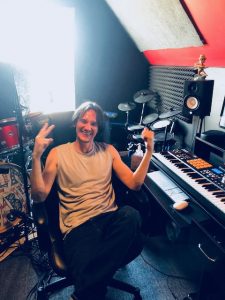
Sitting on a lamp table in the green room section of the studio was a small tequila bottle that had been repurposed as a vessel for some 100% Mississippi moonshine. When I learned it was a gift to me, I poured a taste (a very small one) and found that it had a similar way of smoking the vocals that certain bourbons do. As Chief Dan George once said in my favorite 70’s movie “Little Big Man” — sometimes the magic works, sometimes it doesn’t. The magic was working in the Checkerboard Lounge and Cody and I found ourselves going at it till end of day, and then resuming in the morning to record more of my originals that he responded well to.
When I mentioned that I always imagined gospel-styled background vocals, Cody picked up his phone and sent a text to Sharisse Norman of the Norman Sisters, arguably the most-in-demand backing singers in Memphis. “Seriously?” I said. “The Norman’s?”
“Man, Risse will love this stuff,” Cody said, as he moved — always moving, driving, making notes, and pretty much an unstoppable spark plug of creative energy. Risse Norman showed up and I recognized her from the Netflix documentary “Take me to the River.” One of my songs was in playback and Risse entered, grooving, despite carrying purse and jacket. She entered the room feeling the music and got right down to business. A total pro. While she seemed surprised that we didn’t have lyric sheets, Cody explained that this was unexpected and we were recording on the fly. I wrote down the lyrics on chart paper and, after some discussion of the song’s meaning and my intentions, Risse took to the vocal booth. On my song “Poutine,” she stepped out of the booth, removed her headphones and looked at me. “Are you saying poon-tang??”
When I explained that poutine is a northern dish from Quebec, any sinful variation on french fries and cheese curds topped with brown gravy, Risse gave me a knowing look of mock reproof.
Meanwhile, I had earlier heard Cody raking on an electric washboard in a compelling way, and I asked him to work some of the ‘woogie board’ into the song, to suggest the French-Canadian roots to my blues-without-borders. “You know, Co-Co,” Risse said to Cody. “I have never thought of the washboard as sounding sexy, but you just made that thing sound sexy.”
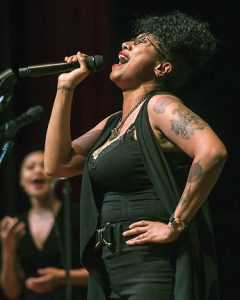
Before singing back-up on “Can’t Have Your Cake”, Risse asked for a taste of the moonshine (a very small one). Watching her groove in the vocal booth and carry my lead upon her soulful pipes, born in the Memphis church, I was a happy man. It was my birthday — and recording my original music, down south, with musicians I admire, was not a bad way to spend it.
Things were heating up in North Mississippi…
TO BE CONTINUED
